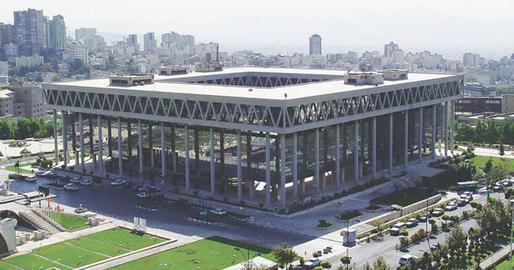It is Iran’s largest news source and only domestic broadcaster, with a huge budget and thousands of staff, and a guaranteed place in national life as the nation’s “Voice and Vision”. But IRIB has lost its way – and the trust of its audiences. What has gone wrong – and what is the way forward? These are questions that are being asked within the organization itself, as Behnam Gholipour has been finding out.
IRIB is the Islamic Republic of Iran Broadcasting (IRIB), and is known in Persian as the Voice and Vision of the Islamic Republic. Its head is appointed directly by the Supreme Leader. Unsurprisingly, a month of anti-government protests has posed a particular challenge for the government broadcaster, as a recent expert review of IRIB’s coverage confirmed.
“Almost half (46.6%) of the experts consulted were critical of the approach and strategy of IRIB in its coverage of the crisis,” the study revealed. “The strongest criticism concerns procrastination, silence and delay.”
What is perhaps extraordinary is that this research was carried out, not by government critics, but by IRIB itself – or at least its training wing, the IRIB University. The report, entitled “Content Analysis of Experts' Opinions on Crisis News Coverage in IRIB (from 2010 to 2019),” was published in the latest issue of the Quarterly Journal of Interdisciplinary Studies in Communication & Media.
“Considering the advances in technology and in the speed of people’s access to information and news, procrastination and delays in covering crisis news cannot be justified and can undermine [IRIB’s] credibility and trustworthiness,” the study states. “Given the vast number of criticisms over delays in covering crisis news, the organization must meet this challenge by changing its approach.”
Among the strategic causes for failings in IRIB’s coverage, experts identified the following:
- The political perspective (cautiousness, unilateralism and monopolism) (identified by 71% of experts consulted for the study)
- Delays, silence and censorship (42%)
- Lack of first-hand reporting (31%)
Among factors external to the organization that damaged its ability to report effectively on the crisis, the experts noted:
- A faulty grasp of IRIB’s standing as a media outlet
- Insufficient understanding of the media sector among officials
- Pushing IRIB to go beyond its mission
- The impact of competition
- The government and security agencies putting pressure on the organization
More widely, experts identified that the IRIB had been undermined by:
- Lack of public trust (39 percent)
- A traditional and outdated management of news coverage (29%)
- Challenges to IRIB’s authority (14%)
Specifically in regard to IRIB coverage of crises, experts identified:
- Poor content and style (52%)
- Disregard of ethical principles (13%)
- Of lesser but noted concern was incorrect framing, repetition, and the use of clichés
When it comes to coordination with other institutions, experts criticized:
- Faulty interaction with security agencies (53%)
- Lack of coordination with government officials (30%)
Failings in IRIB’s coverage have been starkly revealed during the recent period of nationwide protests, which were sparked by the death of a young woman detained by morality police for not wearing a hijab according to the nation’s strict dress code. But there has been growing criticism of the IRIB for its coverage for some time, including its coverage of the sharp rise in fuel prices that triggered the November 2019 protests and several natural disasters.
The professional pride of the staff has been strongly questioned. A study last year found that 73 percent of employees of the IRIB News Agency were either completely, or to a large degree, indifferent to their job and had no interest in the efficiency of their organization. It also found that 71.5 percent of them either completely, or to a large degree, performed their duties within the narrow framework of a set of guidelines and took no initiatives on their own. It reported that half of all employees were always or usually very careful about expressing their ideas and a similar proportion felt that laughing and joking were frowned upon in the organization, creating a grim working environment.
“Creative human resource is a vital asset for every media organization,” concluded the study, entitled “Assessing the Suitability of IRIB’s News Agency Organizational Atmosphere with the Emergence of Human Resource Creativity in the Arena of News” and published in the same journal as this year’s study.
“Furthermore, the conditions in which creativity emerges are also important. IRIB must enhance its personnel job satisfaction, give them more freedom of action, and diminish conservative working practices.”
It was a bold prescription to improve the health of the nation’s Voice and Vision, albeit a very necessary one. It is not at all clear that the patient is ready to take the medicine.
visit the accountability section
In this section of Iran Wire, you can contact the officials and launch your campaign for various problems

























comments